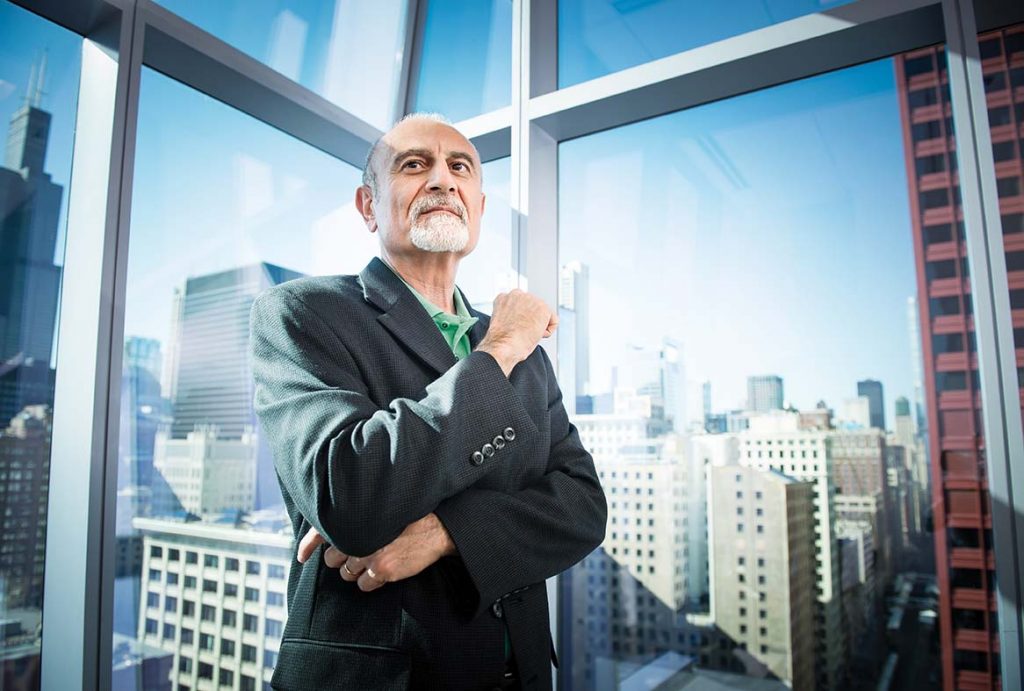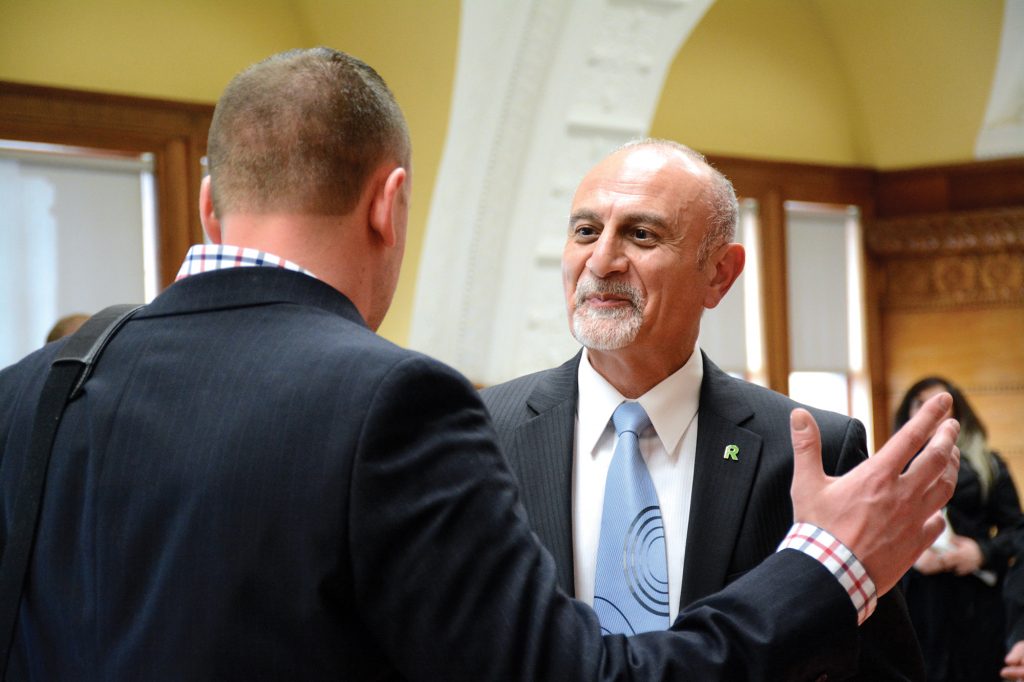
Ali Malekzadeh has the leadership skills, higher education experience, business expertise and personality Roosevelt’s trustees sought in a new president.
“What would you be doing if you weren’t in higher education?”
The question seemed to surprise him, and Ali Malekzadeh, Roosevelt University’s new president, paused and looked around his office before answering. “I never thought of that before,” he replied. “Education is my business. I understand it and have loved every minute of it.”
From the time he was a second grader, Malekzadeh, a native of Iran, wanted to be an educator, and true to his dreams, his entire 33-year career to date has been in education as a university professor and administrator. He’s even married to a professor, Dr. Afsaneh Nahavandi, chair of the Department of Leadership Studies at the University of San Diego.
Malekzadeh, who asks everyone to call him “Ali,” joined Roosevelt on July 1 as the University’s sixth president, succeeding Chuck Middleton who retired after 12 years as president. “The sky is the limit at Roosevelt,” said the former dean of business at Kansas State University, just a short time into his first presidency. “This is a great University with a noble history and outstanding faculty, staff, students and alumni. Our legacy will be to build on those attributes and create an even greater University.”
“This is a great University with a noble history and outstanding faculty, staff, students and alumni. Our legacy will be to build on those attributes and create an even greater University.”
President Ali Malekzadeh
Colleagues who have worked with him in the past have no doubt that his leadership skills, higher education experience and personality will enable him to be a successful president.
“Very few times in your life do you meet someone with a sense of optimism, fairness, and a forward looking and compelling vision, along with a strategy for achieving that vision. I was fortunate to have met that person – Ali Malekzadeh,” said Anand S. Desai, a former associate dean at Kansas State and now dean of the School of Business at Wichita State University.
“When I’m in a difficult meeting or conversation, I ask myself ‘what would Ali do?’” said Raghu Tadepalli, dean of the School of Business at Elon University in Elon, N.C. “And since it’s been six years since we worked together at Xavier University in Cincinnati, that’s the biggest compliment I can pay someone.”
Malekzadeh, 60, first started thinking about becoming a university president six months before the Roosevelt position opened. “I liked being a dean and being a university president was not a lifetime ambition of mine,” Malekzadeh said. Kansas State President Kirk Schulz, a friend and mentor, helped change his mind. He encouraged Malekzadeh to consider becoming a president as his next career move.

So when Witt/Kieffer, Roosevelt’s search firm, contacted him about the presidency, he agreed to an initial interview. “The more I looked into Roosevelt, the more I liked it,” he said. “I was really impressed with the University’s social justice mission and thought the job might be a good fit for me.” It turned out that the feeling was mutual. Malekzadeh impressed every constituency he met during the interview process. In March, the Presidential Search Committee, chaired by trustee and now Board Chair Patricia Harris, recommended his appointment to the Board of Trustees and he was unanimously elected president on March 26.
“During his conversations with the committee,” Harris said, “it became clear that Ali’s collegial disposition, strategic insights and natural affinity for the Roosevelt community made him the resounding choice to serve as Roosevelt’s next president.”
“I have worked in administration at four universities, both public and private, and believe the main responsibility of a leader is to provide an environment where everyone can succeed,” Malekzadeh said. “Organizations are about people and everyone comes to work to be successful. If there’s a problem, we will work to try and solve it.”
Ann Marie Tracey, professor of business law and ethics at Xavier University where Malekzadeh was business dean from 2003 to 2011, said he is “an extraordinary leader.” “I remember going to a community event with him after he’d only been in town for a few weeks and thought I would be introducing him to people. But he already knew everybody,” she said.
Tadepalli said Malekzadeh is able to get along with everyone, from CEOs to custodians. “He is always upbeat, looks on the positive side, is unfailingly courteous and is strategic. Working with him was one of the most professionally satisfying periods of my life.”
The Makings of a President
While many people comment on his energy and enthusiasm, Malekzadeh does much of his thinking and planning while jogging every morning along Chicago’s lakefront, a continuation of his life long interest in fitness and sports. A snow skier, he lifts weights to stay in shape and is a fourth-level black belt in Tae Kwon Do. He was captain of his high school basketball team and a varsity soccer goalie in college.
Fundraising has long been one of Malekzadeh’s strengths. He secured funds for a new business college location at St. Cloud State University in Minnesota, helped raise $30 million for a new business school building at Xavier and raised over $40 million for a new $55 million College of Business facility at Kansas State.
“Ali understands the dynamics of fundraising,” said University of Montana Foundation President and CEO Shane Giese, who worked with Malekzadeh at Kansas State, raising funds for programs, faculty, students and facilities. “He personally drove the vision of building a new business building at K-State, from securing internal support, to developing the concept, to scoping the project with architects and contractors, to fundraising for the effort.”
Malekzadeh’s initial experiences in university administration and faculty leadership were at Arizona State University West in Phoenix where from 1987 to 1998 he helped develop the brand new campus. He helped hire the business faculty and created the Office of Graduate Studies. Since he was first appointed a dean and throughout his career, Malekzadeh has been a strong advocate for faculty and staff development, providing professors and university staff with opportunities to advance their careers.
“Ali changed my life,” said Desai of Wichita State. “In the four years I was at Kansas State with him, he gave me opportunities to grow and develop my skills as an academic leader. He showed me that if you dream it and work hard, you can make it happen.”
Malekzadeh attributes his can-do spirit to his mother and his skills in negotiation to his father, a successful attorney. At one time, Malekzadeh said his dad was requested to be counsel for both parties in a legal dispute between a university in Tehran and the city of Tehran. During a break in the judicial proceedings, he brought both sides together and resolved the issue. Years later, Malekzadeh had a similar experience. While at St. Cloud State, both the labor union and the administration named him as their investigative officer.
“The main responsibility of a leader is to provide an environment where everyone can succeed.”
President Ali Malekzadeh
Malekzadeh’s life in the United States began in 1969 when he was invited to spend the summer in Denver with an American family. “When we landed at Stapleton Airport in Denver, I looked up and it was just like Tehran,” he said. “Fourteen thousand feet high mountains, four seasons and very similar weather. I said, ‘Wow, this is it. This is where I want to go to college. I can even continue skiing here.’ So, I spent the summer there and applied to only one university, the University of Denver.”
After earning bachelor’s and master’s degrees in business administration from Denver, Malekzadeh and his wife (Malekzadeh and Nahavandi met in grade school and married in Tehran in 1977) went to the University of Utah to earn doctoral degrees in business. Then in January of 1979 after the Islamic Revolution, Malekzadeh and Nahavandi were unable to return to Iran.
Malekzadeh describes the ordeal this way: “It’s like you were born and raised in Illinois and then go to school in Massachusetts. All of a sudden, somebody says, ‘By the way, Illinois won’t let you in anymore.’ They take your passport, punch a hole in your face and give the worthless passport back.”
After the revolution, Malekzadeh and Nahavandi immediately decided to make the United States their home. They completed their doctorates and were granted asylum, allowing them to teach at Northeastern University in Boston. Shortly later, they became U.S. citizens and their two daughters were born and raised in America. Malekzadeh’s contributions to America were recognized on July 4 when the Carnegie Corporation of New York honored him and 37 other “great immigrants” from more than 30 countries with a full-page ad in the New York Times.
During his first weeks at Roosevelt, President Ali Malekzadeh has been busy participating in University life: trying on Roosevelt gear, meeting parents of students and joining in activities with students.
Although Malekzadeh is still forming his agenda for Roosevelt, one area he will emphasize is alumni participation. He will be reaching out to graduates and encouraging them to become more involved in the life of Roosevelt students by being mentors, providing internships and supporting scholarships. “We want alumni to be so proud of their alma mater that they call us and say ‘how can we help you?’”
The mentoring program will be based on successful programs he implemented at Kansas State and Xavier. At Kansas State more than 560 undergraduate students had executive mentors, while at Xavier more than 500 people volunteered to advise students with their careers. This helped improve the college’s job placement rate to 98 percent.
“Ali is a strong believer in getting students hands-on experience with internships,” Giese said. “He enjoys the process of watching students mature in their work and their outlook on what they want to do with their lives.”
For someone whose business has always been education, it won’t take Roosevelt’s new president long to capitalize on the University’s opportunities and build on its legacy. “We’re here to educate people and provide an open environment where absolutely everybody can thrive and succeed and achieve the American Dream. I think that’s what Roosevelt has been and always will be about,” he said.



Leave a Reply